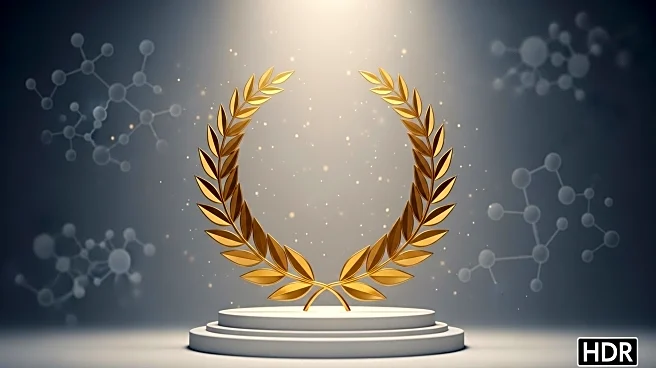What's Happening?
Mary E. Brunkow, Fred Ramsdell, and Shimon Sakaguchi have been awarded the Nobel Prize in Medicine for their groundbreaking work on peripheral immune tolerance. This discovery has significantly advanced the understanding of how the immune system prevents itself from attacking the body's own tissues. The Nobel Assembly highlighted that their research has spurred the development of medical treatments for cancer and autoimmune diseases, with several treatments currently undergoing clinical trials. The announcement was made by the Nobel Committee at the Karolinska Institute in Stockholm. Brunkow and Ramsdell are based in the United States, while Sakaguchi is from Japan. Their work began with Sakaguchi's discovery of regulatory T cells in 1995, followed by Brunkow and Ramsdell's identification of a mutation in the Foxp3 gene in 2001, which plays a crucial role in autoimmune diseases.
Why It's Important?
The recognition of these scientists underscores the critical importance of understanding immune system regulation. Their discoveries have paved the way for new therapeutic approaches to treat autoimmune diseases and improve the success of organ transplants. By identifying the mechanisms that prevent the immune system from attacking the body, their work holds promise for developing treatments that could mitigate the effects of diseases like multiple sclerosis and type 1 diabetes. The award highlights the potential for these findings to transform medical practices and improve patient outcomes globally. The Nobel Prize serves to acknowledge the profound impact of their research on both scientific understanding and practical medical applications.
What's Next?
The Nobel Prize announcement marks the beginning of a series of Nobel recognitions, with the physics, chemistry, and literature prizes to follow in the coming days. The award ceremony for the Nobel Prize in Medicine will take place on December 10, coinciding with the anniversary of Alfred Nobel's death. The laureates will share a prize of 11 million Swedish kronor, approximately $1.2 million. The scientific community will likely continue to explore the implications of their discoveries, potentially leading to further advancements in medical treatments and therapies. The ongoing clinical trials of treatments based on their research will be closely watched for their outcomes and potential to revolutionize healthcare.









